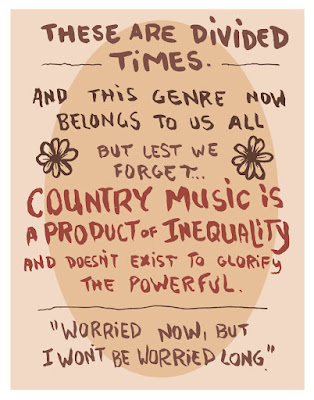There are a plethora of musical genres encompassed by the expression "folk music" and why not; it is all music by folk, right? But at the Edmonton Folk Music Festival this year, it was country(ish) music that caught my ear the most. Which was a little surprising to me, but maybe it shouldn't have been.
Saturday was a long day for Glory and I, but we were intent on staying for at least part of the closing act, Old Crow Medicine Show. They didn't take the stage until nearly 11 pm, but opening up with two high-energy renditions of songs about cocaine, of all things, really enervated the crowd, us included. They were "Cocaine Habit":
Well, that cocaine habit is awful bad
The worst doggone habit that I ever had
Hey, hey, honey take a whiff on me
And "Tell It To Me":
Tell it to me, tell it to me
Drink your corn liquor, let the cocaine be
Cocaine's gonna kill my honey dead
Glory was convinced that live-wire frontman Ketch Secor had to be speaking from experience due to a dynamic 110% effort that would put most pro athletes to shame, but that is neither here nor there...
In the weeks afterwards I would often prompt music from the Google Home speaker by requesting "Cocaine Habit" or Tell It To Me and then seeing what sort of selections might follow them up, a technique we call "seed music." Sometimes it would be old-timey country from my "Rusticated" playlist, at others more modern but non-mainstream artists like Corb Lund that I have listened to previously, but on occasion it would pull something delightful from way out in left or right field, or possibly underneath the bench in the dugout.
And I was surprised and delighted to find these slices of Americana incorporate all sorts of themes beyond the truck-driving and freedom-cheering that dominates C&W radio. Consider the environmental apocalypism outlined by The Devil Makes Three in "Allelu":
What will it take to have this place on bended knee
You run to the forest, you can bet I'll burn the trees
I will poison the water 'cause it's only getting hotter
And we came for sons and daughtersHallelu
(chorus)
Hallelu, Hallelu, praise the lord and pass the ammunition tooThey say Jesus is coming, he must be walking, he sure ain't runningWho can blame him, look how we done him, Hallelu
I ain't slept in seven days, haven't ate in three
Methamphetamine has got a damn good hold of me
My tweaker friends have got me to the point of no return
I just took the lighter to the bulb and watched it burn
(chorus)
This life of sin has got me in
Well it's got me back in prison once again
I used my only phone call to contact my daddy
I got twenty long years for some dust in a baggie
My life's a bit more colderDead wife is what I told herBrass knife sinks into my shoulderOh babe don't know what I'm gonna doI see my red head, messed bed, tear shed, queen beeMy squeezeThe stage it smells, tells, hell's bells, miss-spellsKnocks me on my kneesIt didn't hurt, flirt, blood squirt, stuffed shirtHang me on a treeAfter I count down, three rounds, in hell I'll be in good company
Well the raven is a wicked bird
His wings are black as sin
And he floats outside my prison window
Mocking those within
And he sings to me real low
It's hell to where you go
For you did murder Kate McCannon
I grew a little into deafening rageEvery hometown is a well built cageBe it high iron, highway or stageDon’t let it be all badI’ve been indebted to a surgeon’s bladeProbation officers and nerves that frayedOnly the choiceless every gladly stayedRefuse to be all bad




No comments:
Post a Comment